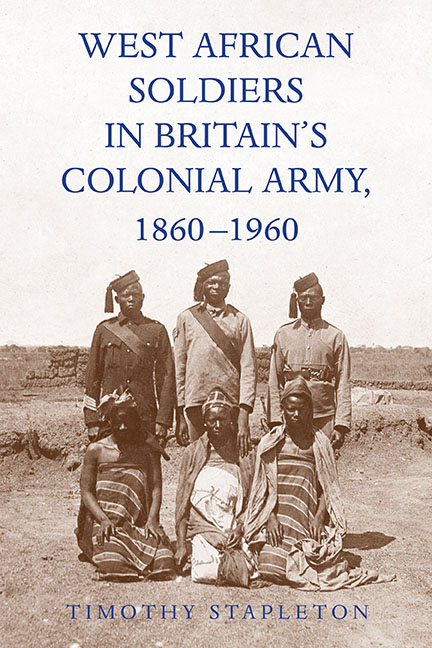Book contents
Appendix: Biographies
Published online by Cambridge University Press: 07 October 2022
Summary
Since colonial authored documents offer scant information about the individual soldiers who made up Britain's West African army, these mini-biographies seek to illustrate the life experience of a few of these almost forgotten men. In the absence of detailed service records for most West African military personnel, those who received special awards or punishments are usually the only ones who stand out from the almost anonymous rank-and-file. Reflecting a variety of territories and periods, the following soldiers represent examples of the tiny number whose names appear more than once in colonial military records or other documents.
Bawa Yawuri: Bush-Fighter Turned Imam
Around 1870 Bawa Yawuri was born in Ilorin, the most northerly Yoruba town in western Nigeria conquered by Fulani jihadists from further north about fifty years earlier. The name Bawa Yawuri indicates Hausa ethnicity and family origins further north. At some point, he traveled around 220 miles south from Ilorin to the British coastal enclave of Lagos with the circumstances of this movement remaining unknown. At the start of the 1890s, when he was around twenty years old, Bawa enlisted in the Lagos Constabulary, previously known as the Armed Hausa Police. He was a Muslim like most of the other soldiers in that Lagos-based colonial paramilitary formation, which included an imam and Arabic teacher, and generously accommodated Muslim religious life. In 1892, as a young soldier, Bawa participated in the British colonial subjugation of the Yoruba state of Ijebu about sixty miles northeast of Lagos. Bawa was among 165 troops from the Lagos Constabulary who joined 150 GCC and one hundred Sierra Leone– based WIR soldiers as well as allies from the nearby Yoruba state of Ibadan for the attack on Ijebu. At the Battle of Imagbon, in mid-May, Bawa and the other colonial troops fought their way through thick forest and waded across the forty-yard-wide Osun River under enemy fire to defeat the seven thousand to eight thousand–strong Ijebu army. Like the other soldiers from Lagos, Bawa may have hesitated to cross the river given a rumor that the Ijebu people had made a human sacrifice to secure assistance from the river goddess Osun—or perhaps it was enemy bullets that discouraged them.
- Type
- Chapter
- Information
- West African Soldiers in Britain's Colonial Army, 1860-1960 , pp. 337 - 352Publisher: Boydell & BrewerPrint publication year: 2021

